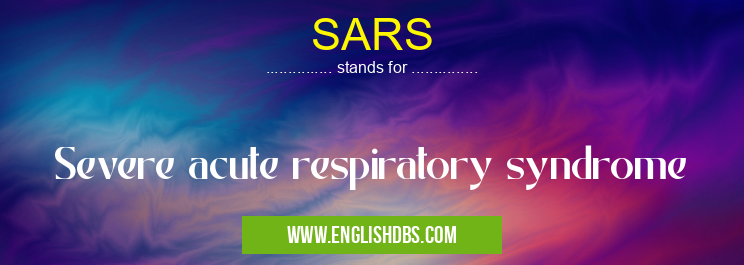What does SARS mean in THERAPEUTICS
SARS stands for Severe acute respiratory syndrome, an infectious disease affecting the respiratory system. It's caused by a coronavirus, a family of viruses known to cause pneumonia and other respiratory illnesses.

SARS meaning in Therapeutics in Medical
SARS mostly used in an acronym Therapeutics in Category Medical that means Severe acute respiratory syndrome
Shorthand: SARS,
Full Form: Severe acute respiratory syndrome
For more information of "Severe acute respiratory syndrome", see the section below.
» Medical » Therapeutics
Symptoms
Common SARS symptoms include:
- Fever
- Dry cough
- Shortness of breath
- Fatigue
- Muscle aches
- Chills
Transmission
SARS is primarily transmitted through respiratory droplets released into the air when an infected person coughs, sneezes, or talks. Contact with contaminated surfaces or objects can also spread the virus.
Diagnosis
Diagnosis involves evaluating symptoms, patient history, and laboratory testing. Chest x-rays or computed tomography (CT) scans may be used to visualize lung abnormalities.
Treatment
There is no specific cure for SARS. Treatment focuses on supportive care, including:
- Oxygen therapy
- Fluid and electrolyte management
- Antiviral medications
Prevention
Preventive measures include:
- Regular handwashing
- Respiratory hygiene (covering coughs and sneezes)
- Avoiding contact with infected individuals
- Isolation for infected individuals
Essential Questions and Answers on Severe acute respiratory syndrome in "MEDICAL»THERAPEUTICS"
What is SARS?
SARS is a viral respiratory illness that can cause severe symptoms, including fever, cough, shortness of breath, and difficulty breathing. It is caused by the SARS coronavirus (SARS-CoV).
How is SARS spread?
SARS is primarily spread through close contact with an infected person through respiratory droplets produced when they cough, sneeze, or talk. It can also be transmitted by touching surfaces or objects contaminated with the virus and then touching your face.
What are the symptoms of SARS?
Symptoms of SARS can range from mild to severe and may include:
- Fever
- Cough
- Shortness of breath or difficulty breathing
- Chills
- Muscle aches
- Headache
- Fatigue
- Loss of taste or smell
How is SARS diagnosed?
SARS is diagnosed based on a person's symptoms and a laboratory test that detects the SARS coronavirus. The test is typically a nasal swab or sputum sample.
Is there a cure for SARS?
Currently, there is no specific cure for SARS. Treatment focuses on supportive care to manage symptoms and prevent complications.
How can I prevent SARS?
To prevent SARS, follow these measures:
- Practice good hygiene, including frequent handwashing and covering your mouth and nose when coughing or sneezing.
- Wear a mask in public places where there is a high risk of exposure.
- Avoid close contact with people who are sick.
- Get vaccinated if a SARS vaccine is available.
What are the complications of SARS?
Complications of SARS can be serious and include:
- Pneumonia
- Acute respiratory distress syndrome (ARDS)
- Respiratory failure
- Kidney failure
- Liver failure
- Myocarditis (inflammation of the heart muscle)
Final Words: SARS is a serious respiratory illness that can have severe health consequences. Early detection, prompt treatment, and preventive measures are crucial for mitigating its impact. Understanding the abbreviation SARS and its implications enables individuals to take appropriate actions to protect their health and well-being.
